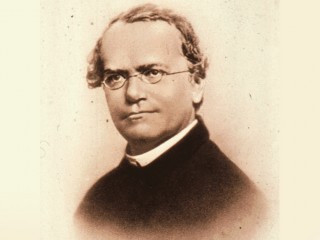
Gregor Mendel biography
Date of birth : 1822-07-20
Date of death : 1884-01-06
Birthplace : Odrau, Austrian Silesia
Nationality : Austria-Hungary
Category : Science and Technology
Last modified : 2010-07-19
Credited as : Augustinian priest, scientist in genetics, made the study of the inheritance of certain traits in pea plants
103 votes so far
Mendel was born into an ethnic German family in Heinzendorf bei Odrau, Austrian Silesia, Austrian Empire (now Hynčice, Czech Republic), and was baptized two days later. He was the son of Anton and Rosine Mendel, and had one older sister and one younger. They lived and worked on a farm which had been owned by the Mendel family for at least 130 years. During his childhood, Mendel worked as a gardener, studied beekeeping, and as a young man attended the Philosophical Institute in Olomouc in 1840–1843. Upon recommendation of his physics teacher Friedrich Franz, he entered the Augustinian Abbey of St Thomas in Brno in 1843. Born Johann Mendel, he took the name Gregor upon entering monastic life. In 1851 he was sent to the University of Vienna to study under the sponsorship of Abbot C. F. Napp. At Vienna, his professor of physics was Christian Doppler. Mendel returned to his abbey in 1853 as a teacher, principally of physics, and by 1867, he had replaced Napp as abbot of the monastery.
Besides his work on plant breeding while at St Thomas's Abbey, Mendel also bred bees in a bee house that was built for him, using bee hives that he designed. He also studied astronomy and meteorology, founding the 'Austrian Meteorological Society' in 1865. The majority of his published works were related to meteorology.
He was ordained into the priesthood in August of 1847. After his ordination, Mendel was assigned to pastoral duties, but it soon became apparent that he was more suited to teaching. In 1849, he was assigned to a secondary school in the city of Znaim. It was there that he took the qualifying examination for teacher certification and failed. In 1851 he entered the University of Vienna to train to be a teacher of Mathematics and Biology. It was at the University of Vienna that he developed his skills as a researcher which he utilized later in his life. Mendel returned to teaching in Brünn in 1854. Two years later he again attempted the state certification examination. He became quite ill, perhaps as a result of severe debilitating test anxiety, and he withdrew. He did attempt to take the examination again, but returned to Brünn in 1856 where he continued to teach part-time. Toward the end of his life, in 1868, Mendel was promoted in the monastery to Abbot. He died on January 6, 1884.
During the middle of Mendel's life, Mendel did groundbreaking work into the theories of heredity. Using simple pea pod plants, Mendel studied seven basic characteristics of the pea pod plants. By tracing these characteristics, Mendel discovered three basic laws which governed the passage of a trait from one member of a species to another member of the same species. The first law states that the sex cells of a plant may contain two different traits, but not both of those traits. The second law stated that characteristics are inherited independently from another (the basis for recessive and dominant gene composition). The third theory states that each inherited characteristic is determined by two hereditary factors (known more recently as genes), one from each parents, which decides whether a gene is dominant or recessive. In other words, if a seed gene is recessive, it will not show up within the plant, however, the dominant trait will. Mendel's work and theories, later became the basis for the study of modern genetics, and are still recognized and used today.
His work led to the discovery of particulate inheritance, dominant and recessive traits, genotype and phenotype, and the concept of heterozygous and homozygous. Unfortunately, Gregor Mendel was not recognized for his work by his scientific peers. He found actual proof of the existence of genes, and is considered to be the father of genetics, though his work was relatively unappreciated until the early 1900's.
















